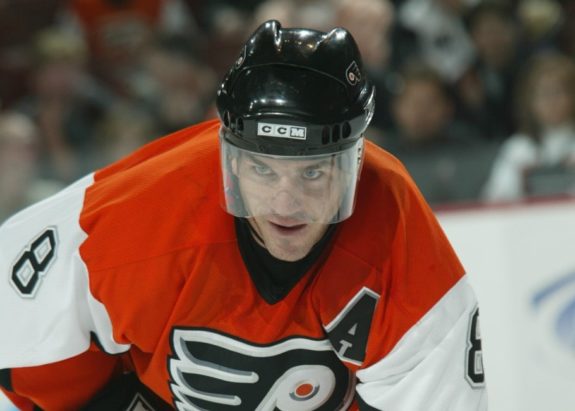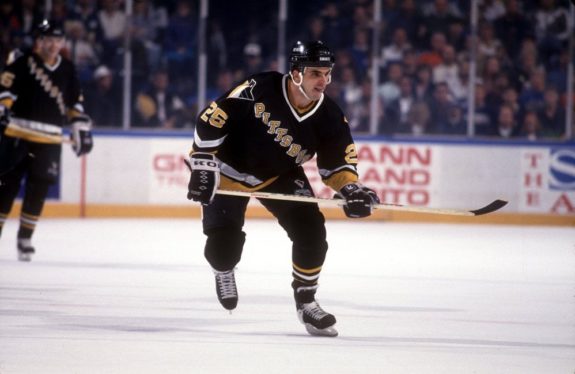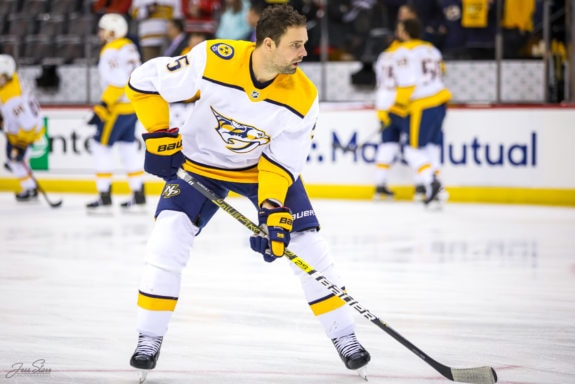Making a trade with your biggest rival is like sitting on a public toilet: it’s dirty, it’s gross and you avoid it whenever possible, but on rare occasions, it’s the best option available.
Pennsylvania’s two NHL teams are fierce rivals, so it stands to reason they’ve only hooked up for three trades so far in this century, including none in the past decade. No general manager wants to give a valuable player to his club’s enemies, so these deals tend to be small. The Philadelphia Flyers and Pittsburgh Penguins did swing a rare blockbuster in 1992 that saw Mark Recchi, Rick Tocchet, Ken Wregget and Kjell Samuelsson change addresses, but those are about as common as Halley’s Comet.

Here’s a look at the three times in the 21st century the Flyers and Penguins have pinched their noses and dealt with each other.
Kevin Stevens for John Slaney
Stevens had a very successful career as a power forward, especially in the first half of the 1990s, when he topped 40 goals four times and 100 points twice. In earlier days, the left winger had been traded for the likes of Tocchet, Luc Robitaille and Glen Murray. But he was on his last legs when the Flyers traded him to the Penguins on Jan. 14, 2001 for Slaney, a fringe defenseman who by that point in his career was playing more in the minors than the NHL. He hadn’t played a game for Pittsburgh that season.
Related: Flyers History: Every GM’s 3 Best Moves
Stevens had enjoyed the most productive years of his career in Pittsburgh, but his second stint was nowhere near as illustrious. To be fair, he was never the same after suffering a serious head injury in the 1993 playoffs, and by this point, his drug addictions were wreaking havoc on him personally and professionally.
Stevens would only play 64 NHL games after the trade before retiring. He had just nine points in 23 games for the Flyers but managed to turn it around in southwestern Pennsylvania, posting eight goals and 23 points in 32 games. He added three goals and three assists in 17 playoff games as Pittsburgh made it to the conference final. The 2001-02 season was his last, and his career ended the way a flame flickers and dies. He appeared in only 32 games for the Penguins and managed one goal and four assists.

As for Slaney, he played the hero for Team Canada at the 1991 World Junior Hockey Championship but never lived up to being selected ninth overall by the Washington Capitals in 1990. He played 268 games in the NHL for seven teams, but more than double that in the AHL, where he was a perennial All-Star.
He’s now a member of the AHL Hall of Fame. At the time of the trade, Slaney had racked up well over a point per game in the minors, and he didn’t play for the Flyers that season either. He had some phenomenal years for their AHL team, the Philadelphia Phantoms, but played only five games for the big club over the next three seasons – one in 2001-02 and four more a couple of years later.
Kent Manderville for Billy Tibbetts
This deal went down on March 17, 2002, barely a year after the Penguins and Flyers’ last deal. Manderville carved out a long career as a big defensive checking center and an excellent face-off man. He was 30 when Philadelphia shipped him to Pittsburgh. He never scored more than 16 points in a season, but that wasn’t his job.
Tibbetts, meanwhile, played the tough guy role and that’s perhaps not surprising, given his criminal record both during and after his hockey career (from ‘He’ll always have that conviction,’ Hartford Courant, Feb. 4, 2001).
“He works so hard killing penalties for us. It’s nice to see a guy like that come up big.” -Mario Lemieux on Kent Manderville
ESPN, Nov. 3, 2002
The Flyers were Manderville’s fourth NHL team, and he’d been there for parts of three seasons when they moved him out. But he only played 34 games in 2001-02, 34 with Philadelphia and four with Pittsburgh. The next season was his last in the NHL and he appeared in all 82 games for the Penguins, with two goals and five assists. The Pens didn’t make the playoffs either spring, and that’s where Manderville’s skill set was most valuable.
Tibbetts, meanwhile, achieved the improbable feat of making the NHL after spending 39 months in jail between 1996 and 1999 for assault, battery with a weapon and violating his probation from a previous case (from ‘NHL: Rangers release Tibbetts,’ New York Times, March 19, 2003).
He’d been playing in the ECHL before the prison sentence, but after the Penguins signed him in 2000 he managed to score a point per game with their AHL affiliate. Tibbetts played 62 games for Pittsburgh over two seasons, recording 188 penalty minutes and nine points. He played only nine games for the Flyers, producing 69 PIMs and one assist. He signed with the New York Rangers organization that summer and played his last 11 NHL games with them in 2002-03.
Penguins, Flyers Both Fail to Sign Hamhuis
The most recent trade between the Pennsylvania rivals was 10 years ago, and the player didn’t suit up for either team. Dan Hamhuis was a highly coveted free agent in the summer of 2010 after six seasons shutting down stars on the Nashville Predators’ blue line.
The Flyers wanted to take a shot at signing him before he hit the market, a strategy they’d used successfully before with Scott Hartnell and Kimmo Timonen, so they sent defenseman Ryan Parent to the Predators on June 19 for the rights to Hamhuis. Ironically, they both ended up with the Canucks the next season. Parent only played four more games in the NHL.
Philadelphia didn’t have any luck convincing Hamhuis to sign, but in a remarkable turn of events, they managed to get an asset for him six days later at the NHL Entry Draft. The Penguins were willing to give up a third-round pick in 2011 for a crack at Hamhuis. Alas, he spurned their advances as well, signing a six-year deal with Vancouver to return to his home province.

A year later, the Flyers took another chance on acquiring a player’s rights before free agency, sending the third-rounder to the Phoenix Coyotes for Ilya Bryzgalov, who did sign there. The Coyotes used the 84th overall pick on defenseman Harrison Ruopp, who never played an NHL game and was last seen in the British league in 2018-19. So neither team was burned for taking a stab at Hamhuis.
Related: NHL 500-Goal Club
To bring this full circle, Hamhuis announced his retirement in Aug. 2020 after a 16-year career that spanned more than 1,100 games. He spent his last two seasons back in Nashville where he started, after six years with the Canucks and two with the Dallas Stars.
Flyers and Penguins general managers Chuck Fletcher and Jim Rutherford probably won’t be calling each other to talk trade anytime soon, and if they do pull the trigger on something, expect it to be minor.